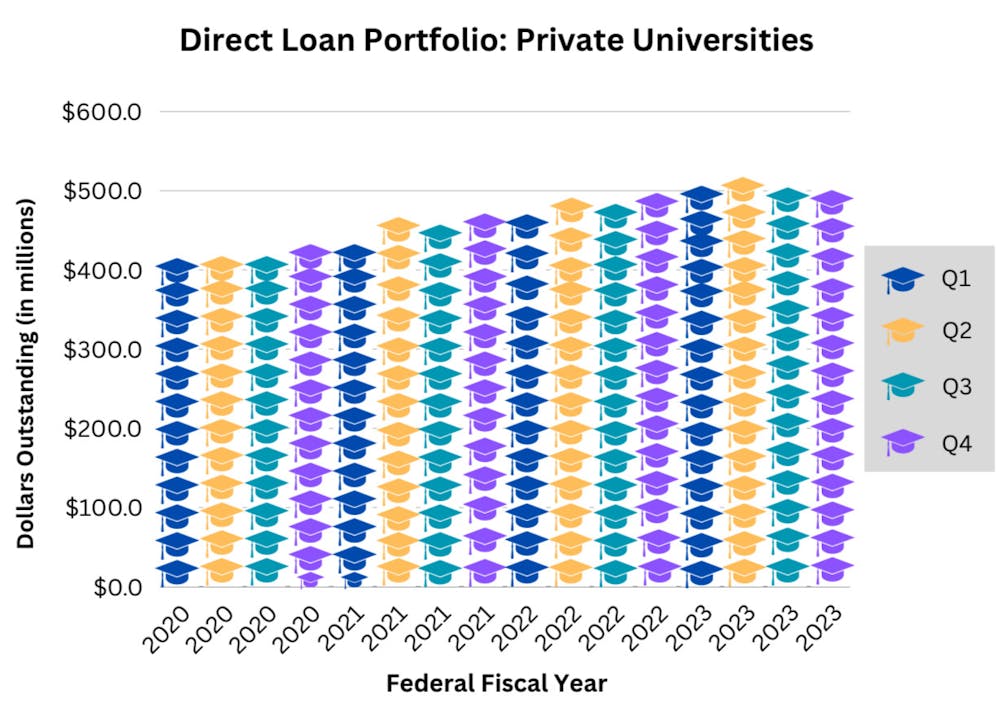From the Newsstands: This story appeared in The Eagle's April 2024 print edition. You can find the digital version here.
American University’s timeline for financial aid offers remains in place after the Free Application for Federal Student Aid was impacted by the U.S. Department of Education’s failure to adjust for inflation.
The Department of Education said in a Feb. 5 statement that it will support more college students and families after this year’s FAFSA experienced issues that may cause financial aid offers for college students to be less generous and inclusive than in previous years. The department has also announced that it will delay the release of the FAFSA and other financial information to universities until March.
Three years ago, Congress set out to alter the FAFSA form to be simpler to use and extend the threshold for aid eligibility to help more low-income students. The Department of Education was told to use a “more generous formula” to include more families of various financial statuses. Congress also told the department to adjust for current inflation rates, but it did not. Instead, the department used old figures from 2020, before the current spike in inflation.
Specifically, the department failed to adjust income protection allowance — the basic living expenses of a family — calculations to modern levels, and recent rises in inflation made this all the more important. Without adjusting for current inflation rates, more of one’s income is calculated to apply toward financial aid — making it seem as though a family’s disposable income is more than it is.
Dhruv Patel, a junior in the School of International Service, said the possible disruption or miscalculation of financial aid could hurt many students’ situations. Patel said the department should work to resolve any potential mistakes as soon as possible.
“FAFSA should acknowledge the error they made and rectify the situation quickly by adjusting the calculations and communicating with individuals and families to ensure they were not penalized for the mistakes made by the [Department of Education],” Patel said.
Maymorgan Lusk, a sophomore in the School of Public Affairs and the College of Arts and Sciences, agreed it is important for students to receive financial aid letters on time and that they accurately reflect their financial situations. Lusk said the University should consider the possibility of the FAFSA distributing lower quantities of aid when giving out aid.
“Students around the country are waiting to see if they can feasibly continue attending college with the release of the FAFSA,” Lusk said. “American University has the resources to provide said students with their award letter on time and provide low and middle-class students not receiving funding from FAFSA with higher grants.”
The office says there are about 119,000 D.C. borrowers who have received some form of FAFSA loan as of September 2023. The office indicated an overall outstanding balance of $6.4 billion across all D.C. residing loan borrowers, according to the annual FAFSA data release form.
According to the form, the amount of outstanding loan balances for students across the US has increased by $35.9 billion since the fourth fiscal quarter 2020 to 2023, and the number of borrowers has increased by about 300,000 people. Additionally, the number of federal loan recipients at private universities increased by 100,000.
Although the FAFSA aid distribution may be disrupted on a national level, AU’s Internal Communications Manager Jasmine Pelaez said the University will remain consistent with the original timeline of financial aid distribution in the upcoming academic year.
“AU does not anticipate a disruption to our review nor awarding of need-based aid for our current undergraduate students,” Pelaez said in a statement to The Eagle. “Our priority deadline for filing the FAFSA is May 1, providing sufficient time for the Financial Aid Office to review and provide financial aid offer letters by July 1.”
Regarding the incoming class of undergraduate students, Pelaez said the University is diligent about reminding students to complete the form so AU can get an accurate description of their financial needs.
“We have advised families of prospective undergraduate students to complete the required CSS Profile so we can utilize the financial data to provide a comprehensive financial aid letter,” Pelaez said. “This data allows us to closely approximate prospective students’ federal aid eligibility.”
Pelaez said further information can be found on the FAFSA 2024-25 webpage which will continue to be updated with future information that becomes available from the Department of Education.
The department released a statement on Feb. 5 that says it will begin several new initiatives to help make the FAFSA more accessible and easier to complete, better helping students, colleges and families with the financial aid process.
“The Department’s top priority is to ensure students can access the maximum financial aid possible to help them pursue their higher education goals and bring college in reach for more Americans,” the statement said.
The department introduced a FAFSA College Support Strategy, which will aim to help improve the financial aid process by sending federal expertise to colleges to prepare and process financial aid forms, providing technological resources to support “under-resourced” colleges and giving colleges any additional tools to efficiently “record and deliver financial aid packages.”
According to the statement, the department is allocating “$50 million in federal funding that will be provided to non-profit groups specialized in financial aid support and services.”
This article was edited by Tyler Davis, Abigail Turner and Abigail Pritchard. Copy editing by Luna Jinks, Isabelle Kravis, Sarah Clayton, Ariana Kavoossi and Romy Hermans.





